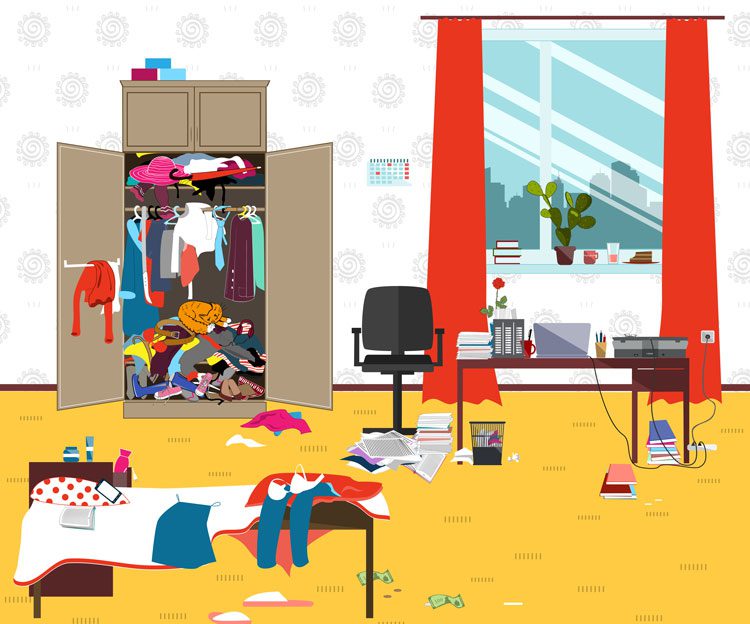We all get disorganized at times.
Obligations pile up that temporarily prevent us from keeping our living space tidy. In fact, about 55 percent of Americans find themselves stressed out by the clutter in their homes. Most of us handle this stress by cleaning on a somewhat regular basis, but when clutter is left unchecked, it can become problematic to the point of threatening our health.
Physical Impact
Having a cluttered space can place our physical well-being at risk:
- The more possessions a person has laying about, the less likely they are to be able to frequently dust and vacuum, and this can be a trigger for dust allergies.
- Slips and falls are more likely when there are more things underfoot.
- Objects are more likely to fall when shelves and tables are overloaded.
- Excess paper or other flammable items can heighten the risk of fire, either by providing fuel or by blocking exits and paths for people who are trying to help extinguish the blaze.
Emotional Impact
Mental health can also be impacted by being surrounded by clutter:
- One study found that women who perceived their homes as cluttered had heightened levels of cortisol, a stress hormone associated with chronic stress.
- People with more clutter expressed less general satisfaction with their lives in another study.
- It is more difficult to focus in an untidy space, especially if you have ADHD.
- People who are embarrassed by the appearance of their home may be less likely to invite guests over, which can increase their sense of isolation. This may partially explain why hoarding often overlaps with depression and anxiety.
- Memory issues can result from sensory overload, which can be triggered or exacerbated by a messy space.
How to Address Clutter
While it can be tempting to get a storage unit or buy organizational tools to help organize the possessions you have, internationally recognized tidying expert Marie Kondo, who has two series on Netflix about tidying different types of spaces, recommends simply discarding things that no longer serve you.
Kondo encourages people to go through their possessions one by one and let go of the things that don’t bring joy or serve a purpose in the person’s life, starting with the least sentimental items. She also recommends going through the entire tidying process all at once for the entire space.
The success of checking things off a to-do list has been found to trigger the release of serotonin, a feel-good chemical that is naturally made in the brain. This good feeling can make it easier to continue staying clean and organized.
- Start small, with one drawer, one cupboard, or the top of one desk. This may be more manageable for people with conditions like depression and ADHD, which can make it more difficult to accomplish tasks such as tidying, cleaning, and disposing of excess.
- It may also be helpful to set a timer and do whatever you can accomplish in 10, 15 or 20 minutes.
- HuffPost suggests having five baskets or boxes to sort things into while decluttering:
- Recycling
- Repair/clean
- Trash
- Donations
- Keep
Maintaining a Clutter-Free Space
Once you have a space that feels tidy and not overcrowded with things you don’t need, it is important to take steps to keep the area clutter-free by:
- Trying to get rid of one or more objects for each new item you bring into the space
- Ensuring that things get returned to their designated spot after each use
- Reminding yourself to finish tasks (for example, don’t consider yourself “done” with the mail until it is recycled, paid, filed, or otherwise processed). This will reduce the tendency for
piles to build up.
Getting Support
Depending on just how much help you need, and if your finances allow for it, it may be helpful to utilize the services of a housekeeper or a professional organizer, either on a one-time basis or as a recurring support.
If you or a loved one are suffering from anxiety, depression, or another mental health disorder, Highland Hospital can help. We offer a comprehensive range of treatment services and will work with you to create a plan that fits your specific needs.






